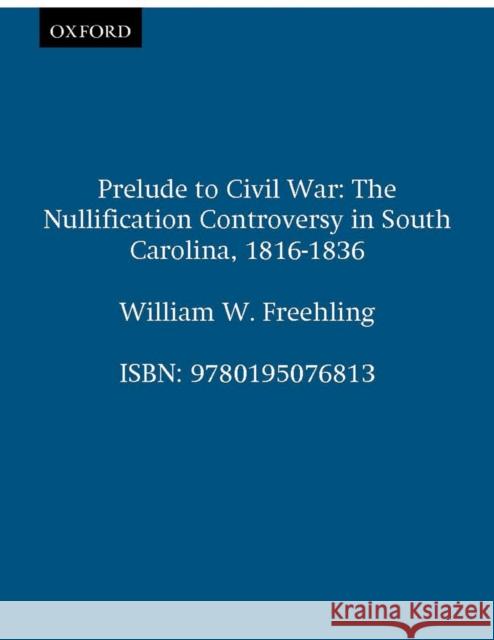Prelude to Civil War » książka
Prelude to Civil War
ISBN-13: 9780195076813 / Angielski / Miękka / 1992 / 416 str.
When William Freehling's Prelude to Civil War first appeared in 1965 it was immediately hailed as a brilliant and incisive study of the origins of the Civil War. Book Week called it "fresh, exciting, and convincing," while The Virginia Quarterly Review praised it as, quite simply, "history at its best." It was equally well-received by historical societies, garnering the Allan Nevins History Prize as well as a Bancroft Prize, the most prestigious history award of all. Now once again available, Prelude to Civil War is still the definitive work on the subject, and one of the most important in ante-bellum studies.
It tells the story of the Nullification Controversy in South Carolina, describing how from 1816 to 1836 aristocratic planters of the Palmetto State tumbled from a contented and prosperous life of elegant balls and fine Madeira wines to a world rife with economic distress, guilt over slavery, and apprehension of slave rebellion. It shows in compelling detail how this reversal of fortune led the political leaders of South Carolina down the path to ever more radical states rights doctrines: in 1832 they were seeking to nullify federal law by refusing to obey it; four years later some of them were considering secession.
As the story unfolds, we meet a colorful and skillfully drawn cast of characters, among them John C. Calhoun, who hoped nullifcation would save both his highest priority, slavery, and his next priority, union; President Andrew Jackson, who threatened to hang Calhoun and lead federal troops into South Carolina; Denmark Vesey, who organized and nearly brought off a slave conspiracy; and Martin Van Buren, the "Little Magician," who plotted craftily to replace Calhoun in Jackson's esteem. These and other important figures come to life in these pages, and help to tell a tale--often in their own words--central to an understanding of the war which eventually engulfed the United States.
Demonstrating how a profound sensitivity to the still-shadowy slavery issue--not serious economic problems alone--led to the Nullification Controversy, Freehling revises many theories previously held by historians. He describes how fear of abolitionists and their lobbying power in Congress prompted South Carolina's leaders to ban virtually any public discussion of the South's "peculiar institution," and shows that while the Civil War had many beginnings, none was more significant than this single, passionate controversy.
Written in a lively and eminently readable style, Prelude to Civil War is must reading for anyone trying to discover the roots of the conflict that soon would tear the Union apart.











